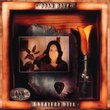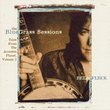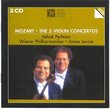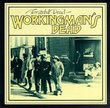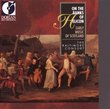| All Artists: George Frideric Handel, Taverner Choir & Players, Andrew Parrott, Mary Nichols, Jill Feldman, Emma Kirkby, Emily van Evera, Joseph Cornwell, Margaret Cable, David Thomas Title: Handel - Carmelite Vespers 1707 / Feldman · Kirkby · Van Evera · M. Cable · M. Nichols · Cornwell · Thomas · Parrott Members Wishing: 0 Total Copies: 0 Label: Virgin Veritas Release Date: 6/8/1999 Genres: Pop, Classical Styles: Vocal Pop, Opera & Classical Vocal, Historical Periods, Baroque (c.1600-1750) Number of Discs: 2 SwapaCD Credits: 2 UPCs: 724356157927, 724356157958 |
Search - George Frideric Handel, Taverner Choir & Players, Andrew Parrott :: Handel - Carmelite Vespers 1707 / Feldman · Kirkby · Van Evera · M. Cable · M. Nichols · Cornwell · Thomas · Parrott
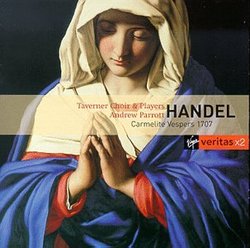 | George Frideric Handel, Taverner Choir & Players, Andrew Parrott Handel - Carmelite Vespers 1707 / Feldman · Kirkby · Van Evera · M. Cable · M. Nichols · Cornwell · Thomas · Parrott Genres: Pop, Classical
His own Lutheranism notwithstanding, Handel wrote some remarkable music for the Catholic liturgy while in Rome as a young man. In our era they've been performed in the concert hall--large-scale, multi-movement pieces such ... more » |
Larger Image |
CD DetailsSynopsis
Amazon.com His own Lutheranism notwithstanding, Handel wrote some remarkable music for the Catholic liturgy while in Rome as a young man. In our era they've been performed in the concert hall--large-scale, multi-movement pieces such as the robust Dixit Dominus and the gracious Nisi Dominus in particular coming across as miniature oratorios. But they were, in fact, church music--as Andrew Parrott reminds us with this speculative reconstruction of a lavish 1707 Vespers service for which the young Handel provided music. The performance by Parrott and his Taverner groups is exhilarating. The Dixit Dominus in particular packs a real wallop. The contralto, tenor, and bass soloists do excellent work with their limited music, but Handel was obviously writing for star soprano castrati, and the real stars here are Parrott's three (female) soprano soloists. Jill Feldman wasn't in her best voice for this recording: her louder moments can sound a bit strained, but her softer singing is truly lovely and she rips through some forbidding coloratura. Emma Kirkby is, of course, a delight in Laudate pueri, and Emily van Evera sings superbly--her timing in the solemn opening and closing bars of the Salve Regina will have you on the edge of your seat. --Matthew Westphal Similarly Requested CDs
|
CD ReviewsInteresting David Wihowski | Milwaukee, WI USA | 06/07/2000 (4 out of 5 stars) "An interesting attempt at recreating the whole Vespers as it may have been (either Handel did not write a whole Vespers or it has not all come down to us). I liked the attempt: it really could have been that way.I also liked the soloists and the choir and the orchestra. I did feel some of the tempos were a bit faster than was flattering to the soloists and the choir: it seemed they were SO fast that the notes could not even be sung well. And I generally like fast tempos especially by clear voices, as these are. I just felt the tempos were too fast at times. I, like the other reviewer, wanted printed texts included: how much can it cost to add two pages to the album liner? Otherwise it's a fine recording that sheds an interesting light on some of Handel's early works. Though these works are early pieces by Handel (from his brief sojourn in Italy) they show his genius as clearly as many of his more celebrated later works. If you're a Handel devotee, like me, you might want to add this to your collection." A vision of the future emerging from the past Jacques COULARDEAU | OLLIERGUES France | 05/07/2004 (5 out of 5 stars) "This young man, only 22 in 1707, has composed here some of the most advanced Vespers of his time if not of all times. He covers an enormous musical range from Gregorian Antiphons to Bach's fugue style and a treatment of instruments and melodies that announces Mozart and all 18th century developments. He is a composer that is able to bring together the heritage of several centuries and the promises of his own time and even his future. He joins heritage and vision in music. What's more he gives to these Vespers a sound and charm that is in the tradition of the Renaissance : the vision of the Virgin is pure, happy, extremely brilliant, beautiful, and absolutely redeeming. No austere element comes into this picture to spoil it. It is Raphael's Virgin, the one we can only see in Dresden in Germany that is projected into our brains, ears, skulls and hearts. Handel is here at his best and yet he is only starting his career and many other bests will come. What's more Andrew Parrott conducts this music with flexibility, brilliance and more than gusto, real enthusiasm. Some wonder how Handel, a German Protestant, could compose such vespers to the Catholic Virgin and for a Catholic religious order. They just don't understand Handel. He is all-inclusive, he is able to absorb, dominate and transcend any style and objective. He knows that music is its own aim and target and not the religious intention. He knows, just like Monteverdi or Bach, that the best way to enhance any religious faith or belief is to provide it with the beauty of the most advanced and varied music one can invent and perform. These Vespers have to be considered as some of the best along with Monteverdi's and Vivaldi's. And they contain no sad lamentation, just the pleasure of knowing that redemption is at the tip of Mary's fingers, provided we can touch her heart. And this music must move her in the deepest layers of her love and care for human sinners, human beings, humanity. In other words this music is a milestone on the road to the Erklärung and the Enlightenment of the 18th century that will produce our modern world. It thus can become an inspiration for the new phase in which we have to navigate towards an ever more humane world. It reverbates with peace and human communion.Dr Jacques COULARDEAU" Latin psalms and Marian motets Jacques COULARDEAU | 06/30/1999 (3 out of 5 stars) "A theoretical reconstruction of what Handel's 1707 Roman vespers might have sounded like. A selection of large scale Latin psalms (HWV 232 237 243 238 235 240 241) originally recorded in 1987 for EMI's now defunct Reflexe label.Parrott marshalls a famous cast including Emma Kirkby, Emily van Evera, Mary Nichols and David Thomas. The black mark (again Mr Branson) no texts. Fair enough most listeners to this repertoire know the words to Nisi Dominus and Salve Regina, but who knows the lyrics to Saeviat tellus inter rigores? Can't help but feel Virgin are being cheap on us here."
|

 Track Listings (24) - Disc #1
Track Listings (24) - Disc #1
